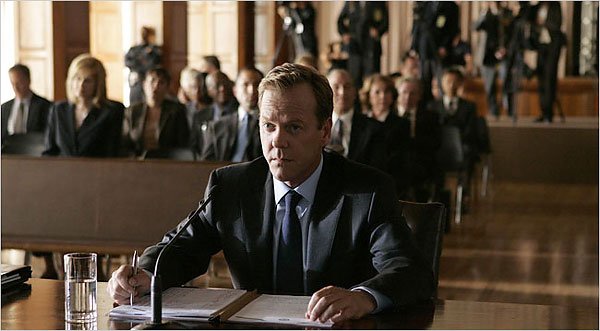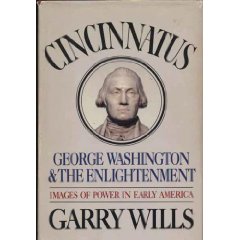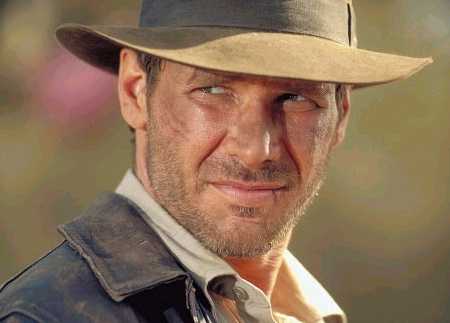By any means necessary

The season started with Jack Bauer testifying as part of a Senate investigation into torture. It doesn’t get much more “ripped from the headlines” than that. There’s something snake-tail-eating about it, too — evidence shows early seasons of 24 encouraged soldiers and others who had not tortured previously to do so. Of course, that’s hardly the show’s fault: It is not a TV show’s responsibility to enforce military discipline and conduct. But at any rate, here was Jack Bauer, answering for his crimes — honestly and unapologetically. It was a strong opening.
And the rest of the season didn’t shy away from it. Doe-eyed FBI “Strong Woman” Renee Walker not-that-gradually turned from shocked, “shocked” at Bauer’s methods in action to practicing them herself, because there appeared to be no other options.

Because of the cool glasses!
Here’s the thing — Jack Bauer tortures people, but Jack Bauer is the hero of the show. Why?
As far back as the Minutemen, Americans have held onto variations on the values of Cincinnatus. When all is well, Americans are a compassionate, peaceful, hardworking citizenry. Generally unconcerned with their neighbors’ affairs, we value liberty and prefer to live and let live. But when duty calls — when extreme necessity or an evil, aggressive act is perpetrated, certain Americans in particular and the country as a whole rise up to do whatever is necessary, then — peaceably and with self-restraint — let things return to normal without seizing undue or corrupting power.
George Washington was the original American Cincinnatus — a humble, soft-spoken farmer who served as a great general in war and stepped aside and gave back power in peacetime.
Most American heroes, real or fictional, are shaped from this mold: Superman, Spider-Man, Captain Marvel, Professor X, Indiana Jones, John Henry, Luke Skywalker, John McClain, Joe DiMaggio, Ted Williams, Sgt. York, Florence Nightingale, Hawkeye, Rand Al’Thor, Buffy the Vampire Slayer, the Men in Black, Henry Roengartner, Doughboy, Rocky, Daniel LaRusso, Bill S. Preston, Esq., Lassie, Ted “Theodore” Logan, Sue Ellen Crandall, Captain Kirk, the list goes on and on and on.
 All these characters do extreme things that would not be permissible under normal circumstances. And they all get forgiven for it, morally if not legally, because they don’t do it under normal circumstances, and because they are reluctant to boss everybody around after it is over.
All these characters do extreme things that would not be permissible under normal circumstances. And they all get forgiven for it, morally if not legally, because they don’t do it under normal circumstances, and because they are reluctant to boss everybody around after it is over.
These characters benefit from a certain amount of moral luck. Americans have historically taken it on faith that it was certain things good Americans just don’t do: murder innocent people is one of them, torture prisoners is another. Thus, our stories don’t tend to include a lot of instances where this sort of things happen — so a character can be shown to have very little restraint in what he or she is doing, but actually exhibit restraint in certain specific matters just because of the tastes of the audience, which, around when 24 came out, were changing a little bit.
These sorts of heroes are routinely called upon to do whatever is necessary, but the story is usually crafted in such a way that torturing or murdering people is almost never necessary, so they never have to make that decision. When it does happen, it’s usually quickly dismissed by the audience as extraneous, a side story, not defining to the character. But it’s the author and audience that set this up — they help the character avoid the difficult points in his or her own morality.
Does that make them better people, that they rarely confront the option, or that they are not held accountable for it? Does Rocky think a lot about the people whose brains he’s damaged? What would Indiana Jones do if he walked in on Marcus Brody interrogating a Nazi with a hot branding iron?

Well, he’d stop it.
Fair enough, but he never does — and he would probably be rewarded in some way for doing it if he did, because it would be unacceptable for him to hold anything back in his mission unless it led to a net positive.
History, tragedy, farce.
We seem in this essay fairly tuned-in to the myths and symbology that haunt the other. Yeah, they had a summer of love. Yeah, they were present during and not totally unaware of some sort of thing with civil rights. Yeah, the musical-industrial complex saw fit to bestow upon them an endearing range of impresarios who even now refuse to bow off the dinosaur-pop stage.
Then they got mortgages in the suburbs and cast their lot with W. It’s easy to make fun of old people. The eyes that saw Woodstock harbor their share of motes. But it may be that our fascination with the semiotics of change blinds us to the essential emptiness of our own beloved zeitgeist. When the primary argument for our current civic direction is the imagined opinion of an imagined history, can we really be headed the way we think? Having abandoned all judgment for the pleasures of marketing, will it be a surprise that we get whatever the marketroids decide? Can we turn this canny social microscope on ourselves?
To be clear, “24” is an awful show: repugnant, ignorant, and incoherent. It has no need for pacing or a narrative arc; it can just crank up the chronological sound effects. Its misguided caricature of the organs of state fulfilled its own prophecy when filtered through the insecurities of a cadre of officers and civil servants who knew well only the political calculus to which they owed their offices. The parody of governance and defense portrayed, justified, and echoed appeals only to those who have forgotten or never considered the fallibility of our natures, the impossibility of really understanding each other.
But let’s not make too much of our sympathy for those poor bastards who live like that. We live like that. We have overthrown Caesar for Octavian, and we imagine that the Republic has been revived. We know that _this_ iteration of the 8-to-12-year petal-picking cycle is special. We like _this_ circus so much more than that other one. We run from one side of our cell of civic possibility to the other, and have no concept of what might be found outside. We are all Americans.
At least it seems like that to me.
@Jess
The primary argument for civic direction is always an imagined opinion of an imagined history. Imagining that history and imagining opinions of it is one of the most important roles of storytelling in human society.
As cynical as you might get, you will never escape the zeitgeist, because the zeitgeist just becomes whatever you escape to. Whatever frame of reference you use to assign meaning to something, it will be based on an idea that at some point will pass through the lens of interpretation.
Take, for example, the War in Iraq. The War in Iraq as it broadly impacts American government and civic life, is a series of imaginations. No one person experienced enough of the War in Iraq to be able to comprehend the entire enterprise, and most of the information – even the good information – comes thirdhand. Maybe you have some amount of information that isn’t imagined, but in in this world, it will never be sufficient to inform an opinion on something as nuanced as human governance without filling in some of the blanks.
So, how do we deal with it? We do the best we can. We can try to pull ourselves out of this game, but, as Milton said and you also articulated, “New Presbyter is but old Priest writ large.” Revolutions don’t end history. Hacking off some part of the world you don’t like, given time, will usually cause something awfully similar to grow in its place – or sprout somewhere else.
So, where does that leave us?
It leaves us as the stewards of history. It leaves us to come up with the story. And that story is important, so it carries with it a great deal of responsibility. That doesn’t mean we don’t imagine – even the most honest stewards of history make their own choices about how the stories are told.
And it also means that the stories that are in play already, especially the ones that inform the zeitgeist, can’t be dismissed with just a wave of the hand and acknowledgement of their falsehood, no matter how repugnant they might be.
I understand your anger – and I share much of it. My original draft of this article had a _lot_ more vitriol directed at politicians and party politics, but I cut it in the interest of trying to stick to the point and not get sidetracked too much in the main article.
But I do think it’s important to try to understand influential ideas and trends that you don’t agree with, and not to insist they are awful and toss them aside as a rule. If they’ve captured people’s imaginations, there’s usually a reason for it, and learning that reason can make us better stewards of history.
I’m not going to go to the mat and say that 24 isn’t awful. A lot of the time it is. But I think you’re letting your own prejudices get in the way of understanding why people like it and why they connect with it. In that way, you are the one with the imaginary opinion (that there’s nothing defensible about 24 that anybody could like) about an imagined history (in which 24 wasn’t a really popular TV show that can be a lot of fun to watch).
But, if 24 teaches us anything, it’s that we all become what we despise.
I think 24 appeals to a lot more people than you do.
I’m not trying to refute you – I think a lot of what you say has merit, and I’m curious, but I want to establish a bit of a framework for where I stand here in relation to what you’ve said.
You say our zeitgeist has “essential emptiness” – in your opinion, is this especially desirable or undesirable, and, if undesirable, what would it take to “fill” it?
Thanks for reading, and I hope you at least enjoyed the photoshops :-)
If you didn’t hav time, you should have just gone for one:
“Tell me where the tags are!”
@fenzel …Jesus, man. That was way deeper than I thought 24 could go. I definitely saw the struggle against Obama Nation in this season, especially when Janeane Garofalo talked, but YOU. You are the man.
Oh, and since you mentioned the photoshops, I love Jack Bauer screaming at the world.
@Fenzel: Thanks for the thoughtful response. I would have responded earlier but was traveling.
First of all, let’s stipulate that I appeal to very few people.
My “To be clear” paragraph was intended as a digression. I do feel that “24” is bad in a bad way, but only thought it necessary to say so because it seemed to run counter to my other thoughts. My main point was that your essay seemed to associate “24” with the old folks who didn’t vote for the epochal change that is Obama, to their mutual discredit, and to counter that nothing has actually changed, IMHO. I thought maybe you were making a bit more of your differences with the conservative masses than could be supported, although your subsequent comments have ameliorated those concerns somewhat.
(Another digression: I also know a number of Obama voters who are ardent “24” fans; I’m not sure where they fit into this analysis. Perhaps they are sophisticated enough to enjoy the carnage on an ironic level, much as hip-hop artists have largely appropriated the n-word for their own purposes.)
I don’t mean “nothing has actually changed” in a trivial “plus ça change” sense, but in the sense that we having been making really terrible public decisions for decades now, and now that we’ve had an election we are still making those terrible public decisions only more so. I no longer believe our system is capable of avoiding these decisions, so I focus more on coping strategies than fighting the good fight. At the same time I’m not exactly inspired by the whole mess, and I feel a bit of pity for those who are.
I may be stodgy in thinking that the marketing narrative shouldn’t govern all our decisions, or cluelessly nostalgic in thinking it hasn’t always done so. I’ll cop to both. I’m left with this: that our public choices are directed by those who have positioned themselves to profit thereby, at the same time that the mass of the public swallows the asinine fake-conflict pap that gets written about it in the papers. (“freedom v. security”, “fairness v. capitalism”, etc.) I could deal with the corruption, if just occasionally someone else acknowledged it. I normally cope with even this grim conceptual situation; maybe there’s something about the erudition of OTI that slips through my practiced indifference and prompts me to write really long comments.
Upon reflection I see that I am guilty of a bit of clumsiness here, because you’re mostly describing the reaction of “24” and its worldview to a perception of Obama rather than describing Obama himself in any concrete way. That is in keeping with OTI, and I can’t really criticize it. Clearly Jack Bauer the character would draw a distinction between W and O. Both W (or his minion/regent Cheney) and O would publicly claim a sea change between their administrations, and I should accept that as a context in which a popular television program can operate.
Events have also overtaken me a a bit in the sense that Obama has made more specific his plans for closing Gitmo. I applaud this and any other plans for our government to obey the law, but I wonder if I too am distracted by a sideshow. After all, the NSA is still bcc’ed on every single email sent in this country. The national public debt is still hockey-sticking. Hank Paulson isn’t in prison yet. I could go on, but I probably shouldn’t. Thanks for the interesting exchange.
To answer your questions: I do object to this particular zeitgeistian emptiness. I don’t think it can be filled without a great deal of real change in our governance and lifestyle, so it isn’t clear that filling it is something that most people would choose even if they were aware of the option.